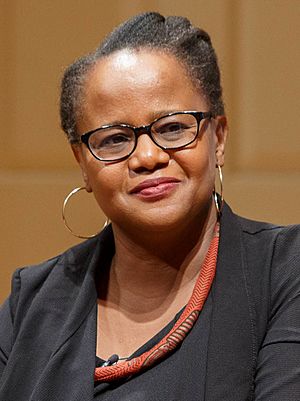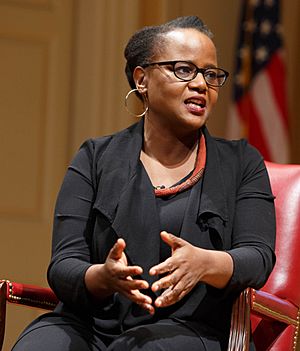Edwidge Danticat facts for kids
Quick facts for kids
Edwidge Danticat
|
|
|---|---|

Danticat, September 2019
|
|
| Born | January 19, 1969 Port-au-Prince, Haiti |
| Occupation | Writer |
| Nationality | Haitian-American |
| Education |
|
| Period | 1994–present |
| Genre | Novels, short stories |
| Notable works | Breath, Eyes, Memory (1994) Krik? Krak! (1996) The Farming of Bones (1998) The Dew Breaker (2004) |
Edwidge Danticat (born January 19, 1969) is a talented Haitian-American writer. She writes novels and short stories. Her first novel, Breath, Eyes, Memory, was published in 1994. It was even chosen for Oprah's Book Club, which made it very popular.
Since then, Danticat has written or edited many books. She has also received many important awards. Her stories often explore ideas like what it means to be from a certain country. She also writes about relationships between mothers and daughters. Another common topic is how people from one country live in another, which is called diaspora politics. In 2023, she became a special professor at Columbia University.
Contents
Early Life and Education
Edwidge Danticat was born in Port-au-Prince, Haiti. When she was two years old, her father, André, moved to New York. Two years later, her mother, Rose, also moved there. Edwidge and her younger brother, André, stayed in Haiti. They were raised by their aunt and uncle.
When she was a child, Edwidge loved storytelling. She also went to church and studied hard for school. Even though her classes in Haiti were in French, she spoke Haitian Creole at home.
Discovering a Love for Writing
Danticat started writing when she was nine years old in Haiti. Later, she wrote a story about moving to America. It was for a magazine called New Youth Connections. The story was titled "A New World Full of Strangers".
She later said that writing for the magazine helped her find her voice. It helped her share her experiences. This first story even grew into her first novel, Breath, Eyes, Memory.
College and Beyond
After finishing high school in Brooklyn, New York, Danticat went to Barnard College. She graduated in 1990 with high honors. She first planned to become a nurse. But her passion for writing was stronger. She earned a degree in French literature.
In 1993, she received a Master of Fine Arts degree from Brown University. This degree is for creative writing. Danticat strongly supports issues that affect Haitian people. This includes those living in Haiti and those living abroad. In 2009, she helped with a documentary called Poto Mitan: Haitian Women Pillars of the Global Economy. This film showed how global changes affect Haitian women.
Personal Life
Edwidge Danticat married Fedo Boyer in 2002. They have two daughters named Mira and Leila. Even though Danticat lives in the United States, she still feels that Haiti is her home. She visits Haiti often and feels a strong connection to it.
Important Themes in Her Work
Edwidge Danticat's books often explore three main ideas. These are national identity, mother-daughter relationships, and how people from one country live in another.
National Identity
Many of Danticat's stories look at what it means to be from a certain country. For example, in Breath, Eyes, Memory, she explores how women's lives were affected by the government in Haiti. She shows how people struggled to feel connected to their heritage. This was especially true for those living outside Haiti. Her book The Farming of Bones tells the stories of people who survived a terrible event in 1937. It shows how that event affected Haitian identity. Danticat helps readers understand Haiti's history. She also shows that the country is much more than just its struggles.
Mother-Daughter Relationships
The connection between mothers and daughters is very important in Danticat's book Breath, Eyes, Memory. The main character, Sophie, goes through experiences similar to her mother, Martine. This shows how strong family ties can be. It also shows how challenges can be passed down through generations.
The book highlights how these women try to heal from past hurts. They work to build healthy relationships. A special part of the story is when Sophie chooses to be her mother's "Marassa." This means becoming a double of herself to share her mother's pain and connect deeply. Marassas represent being alike and loving each other. This shows a very strong bond between mother and daughter.
Living Between Two Cultures
Danticat's books often explore what it's like to live with two different cultures. She shows how Haitian people create a new identity when they move to places like America. It's not always easy, but it's a way to connect their past with their new lives.
Her short stories in Krik? Krak! bring together different communities. These include Haitians, immigrants, women, and mothers and daughters. Danticat gives a voice to those who might feel unheard. She helps them share their experiences.
Danticat also wrote a travel book called After the Dance: A Walk through Carnival in Jacmel, Haiti (2002). In this book, she shares Haiti's rich culture. She talks about its Carnival celebrations and the Haitian Revolution. She wanted readers to feel like they were there. She also shared her own feelings about being an "outsider" even though she was from Haiti. She had not been allowed to join the Carnival as a child. This made her feel like an observer, even when she returned as an adult.
Awards and Honors
Edwidge Danticat has won many awards for her writing. Magazines like Essence and Seventeen have recognized her. Harper's Bazaar named her one of "20 people in their twenties who will make a difference." The New York Times Magazine featured her as one of "30 under 30" people to watch. Jane magazine called her one of the "15 Gutsiest Women of the Year."
Special Honors
- 1995: Woman of Achievement Award, Barnard College
- 1996: Granta magazine's Best Young American Novelists
- 1996: Lila Wallace-Reader's Digest Writers' Awards
- 2009: MacArthur Fellows Program Genius Grant
- 2009: Nicolas Guillen Philosophical Literature Prize, Caribbean Philosophical Association
- 2011: Langston Hughes Medal, City College of New York
- 2012: Smith College Honorary Degree
- 2013: Yale University Honorary Degree
- 2014: PEN Oakland – Josephine Miles Literary Award
- 2017: University of the West Indies Honorary Doctor of Letters (DLitt)
- 2017: Neustadt International Prize for Literature
- 2018: Presidents Award, St. Martin Book Fair
- 2019: St. Louis Literary Award, St. Louis University
- 2020: Vilcek Prize in Literature
Literary Awards
- 1994: Fiction Award The Caribbean Writer
- 1994: Pushcart Prize for "Between the Pool and the Gardenias"
- 1995: National Book Award for Fiction finalist for Krik? Krak!
- 1999: American Book Award for The Farming of Bones
- 1999: Flaiano Literature Prize
- 1999: Super Flaiano of Literature for The Farming of Bones
- 2005: Anisfield-Wolf Book Award for The Dew Breaker
- 2005: The Story Prize for The Dew Breaker
- 2007: National Book Award for Nonfiction finalist for Brother, I'm Dying
- 2007: National Book Critics Circle Award for Nonfiction for Brother, I'm Dying
- 2008: Dayton Literary Peace Prize for Brother, I'm Dying
- 2008: Hurston/Wright Legacy Award for Brother, I'm Dying
- 2011: OCM Bocas Prize for Caribbean Literature for Create Dangerously
- 2014: Andrew Carnegie Medal for Excellence in Fiction, shortlist for Claire of the Sea Light
- 2019: National Book Critics Circle Award for Fiction for Everything Inside
- 2020: The Story Prize for Everything Inside
Works by Edwidge Danticat
Novels
- Breath, Eyes, Memory (1994)
- The Farming of Bones (1998)
- The Dew Breaker (2004)
- Claire of the Sea Light (2013)
Short Story Collections
- Krik? Krak! (1995)
- Everything Inside (2019)
Books for Children and Young Adults
- Behind the Mountains (young adult novel, 2002)
- Anacaona: Golden Flower, Haiti, 1490 (young adult novel, 2005)
- The Last Mapou (children's novel, January 2013)
- Untwine (young adult novel, October 2015)
- Eight Days: A Story of Haiti (picture book, 2010)
- Mama's Nightingale (picture book, 2015)
- My Mommy Medicine (picture book, 2019)
Nonfiction Books
- After the Dance: A Walk Through Carnival in Jacmel, Haiti (travel book, 2002)
- Brother, I'm Dying (memoir/social criticism, 2007)
- Create Dangerously: The Immigrant Artist at Work (essay collection, 2010)
- Tent Life: Haiti (essay contributor, 2011)
- Haiti Noir (anthology editor, 2011)
- The Art of Death (biography, 2017)
- We're Alone (essay collection, 2024)
Films
- Poto Mitan – Writer/Narrator, 2009
- Girl Rising (Haiti) – Writer, 2013
Translations into English
- Jacques Stephen Alexis - L'Espace d'un cillement (1959). In the Flicker of an Eyelid, translated by Carrol F. Coates and Edwidge Danticat (2002).
See also
 In Spanish: Edwidge Danticat para niños
In Spanish: Edwidge Danticat para niños
- Caribbean literature
- Postcolonial literature
 | Madam C. J. Walker |
 | Janet Emerson Bashen |
 | Annie Turnbo Malone |
 | Maggie L. Walker |


